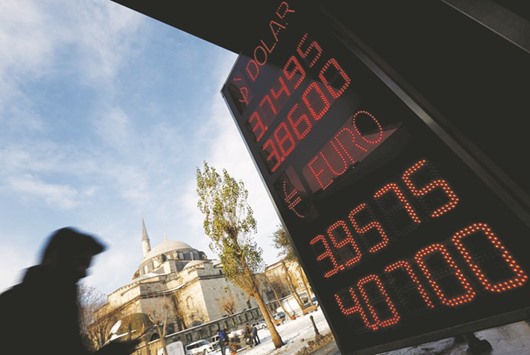Turkey’s lira fell to new lows yesterday, piling pressure on a central bank reluctant to hike interest rates and raising the prospect of investment cuts by firms with high foreign debt if its slide cannot be halted.
The lira has lost more than 9% against the dollar since the start of 2017, making it the worst-performing major currency of the new year, as concern about political and economic stability is compounded by doubts about whether the authorities will take decisive steps to stabilise it.
The central bank’s unwillingness to hike interest rates to stem the lira’s fall has exacerbated worries about militant bombings, an economic slowdown and political uncertainty over plans to bolster President Tayyip Erdogan’s powers.
The lira, which has lost around a quarter of its value against the dollar since an attempted coup in July, was trading around a record low of 3.8990 at 1420 GMT.
“The lira’s blood loss is accelerating...The problem is very clearly particular to us,” said Fatih Keresteci of Istanbul-based DNG Consultancy.
Other emerging markets were mostly trading firmer yesterday.
Some 27,000 companies in Turkey – many of them smaller, family-owned businesses – hold foreign-denominated debt, according to official figures, raising concern about a further slowdown in investment as financing costs rise.
“My chief concern about corporate FX debt would be knock-on effects on domestic demand rather than a wave of bankruptcies,” said Nomura economist Inan Demir. “Even if the companies don’t face solvency issues, they will have to recognise exchange rate losses that will in some cases probably wipe out their operating profits.
I expect this to force companies to seek cost-cutting measures, maybe cancelling or postponing investment spending or laying people off.”
Many of Turkey’s largest companies with significant foreign debt have a natural hedge because a portion of their revenue is earned abroad.
Turkish Airlines, Turk Telekom, Tupras, Koc Holding and Anadolu Efes are among major firms with sizeable forex exposure, according to research by Is Investment.
“From what we hear from local and international banks that are extending FX credit to Turkish corporates, they are comfortable with this borrowing as these FX loans are matched to a large extent by foreign revenues,” said Apostolos Bantis, head of emerging market corporate credit research at Commerzbank. “I’m not particularly concerned about the very large Turkish corporates at this stage but I think that the smaller entities are going to suffer more if the lira devaluates further.”
Erdogan, whose priority is boosting flagging growth, wants lower borrowing costs and is a critic of high interest rates.
Some of his aides and ministers have portrayed the lira’s slide as part of an attack on the Turkish economy.
The economy contracted for the first time in seven years in the third quarter.
Growth is forecast to come in at 3.2% for last year, a far cry from the high single-digit rates on which Erdogan built his reputation as prime minister from 2003-14.
He is keen to prevent the economy losing too much momentum as the country prepares for an expected referendum in the spring on constitutional changes that would create a full presidential system and hand him greater powers.
At its last rate-setting meeting in December, the central bank defied expectations of a hike and left rates on hold.
It will meet again to set rates on January 24.
On Tuesday, the bank reduced forex reserve requirement ratios by 50 basis points in a move it said would add some $1.5bn liquidity to the system.

A board showing the rates of the US dollar and the euro against the lira is on display at a currency exchange office in Istanbul yesterday. The lira has lost more than 9% against the dollar since the start of 2017, making it the worst-performing major currency of the new year.
